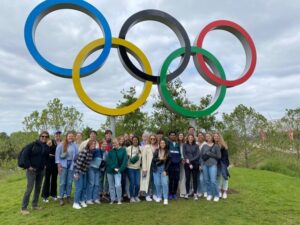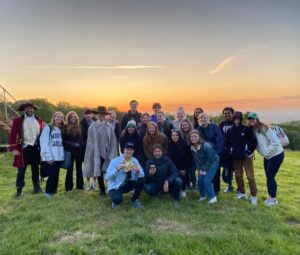 Matt Andrews is an associate professor in the Department of History, specializing in American and sports history. He organized his first London: Olympics, A Burch Field Research Seminar in summer 2023 by offering the Olympic Games: A Global History (HNRS 390). He will continue to lead this program this summer.
Matt Andrews is an associate professor in the Department of History, specializing in American and sports history. He organized his first London: Olympics, A Burch Field Research Seminar in summer 2023 by offering the Olympic Games: A Global History (HNRS 390). He will continue to lead this program this summer.
Q: How did this idea come up?
A: The whole idea comes from the course I teach, History 220, which is a global history of the Olympic Games. That’s a course where I talk about the Olympics, but I use the Olympics to talk about politics from 1896 to the present. The first modern Olympics were organized in 1896. So, we talk about the Cold War, decolonization, the anti-apartheid movement in sports and so on and so forth. You can talk about anything by talking about the Olympic Games like race, gender, national identity, etc. So, I have always wanted to lead a study abroad and London is the first city to host the Olympic Games three times; they hosted them in 1908, in 1948, after the war, and then in 2012. Thus, the idea behind the course is we take the UNC students there.
Q: What is the general structure of this summer school? How many students did you have and what was the selection process like?
A: There were different programs going on. There were people teaching literature, criminal justice, and so on. Every summer there are five or six London programs and mine was just one of them. There were 24 students last year and it will probably be something similar this year. They were from different departments, but we did have some history majors as well. The rule for the Burch Seminar, which is an honors seminar, the students have to have at least a 3.0 GPA and they need to be going into their, at least, second year. It’s naturally competitive.
Q: What is the significance of London for this course?
A: As well as hosting the Olympic games three times, what is great about being in London is that UNC owns a home there called the Winston House, and that is where the classes take place. It is right by the British Museum, and they have a full-time staff there. There is some classroom time where I talk less about the global history of the games and more about the history of the games in England and in London. And London is an obvious place for students to go because there is no language barrier.
 Q: What did UNC students experience there?
Q: What did UNC students experience there?
A: First, students did primary source research and read English newspapers about how people reacted to the games and the meaning of the games in London. We visited some of the sites from 1908, 1948 and certainly 2012. We toured the stadium and talked to people who wanted to celebrate the creation of the Olympic Stadium in 2012 and how good it was for this economically deprived area that is now seeing economic life. But we also talked to some people who have a different take on it and relate stories about people who were displaced from their homes and the gentrification that has happened. The students hereby make up their mind on whether it is a good idea to host the Olympic Games in the modern era. We went to Cambridge and a local historian gave us a Cambridge sports tour. We are going to do the same thing this year but for Oxford this time. We visited Wimbledon, which hosted the tennis events in 2012 (Olympics), and had a tour of the tennis grounds and learned about tennis culture. We went to Lord’s Cricket Ground and we really played cricket.
Q: How did this course help you and students to bring past and present together?
A: The first known reference to the Olympics, kind of in the modern era, is from the early 1600s, and there was a “Costwold Olimpick Games” that was part of the larger culture wars in England at this time. They were a rebuke to increased Puritan control in England. These games are still going on and we traveled to the Costwold Games. The students participated in some of these events and watched some of them. It was an awesome time for participating in these ancient Olympic Games. That is the type of stuff we did then, and we are going to do it again this summer.
Q: Do you have any new ideas for this summer’s course?
A: As it will say on the website, it is going to be from July 20 to August 10. The reason we are going to do it then is that the Summer Olympic Games will be going on in Paris at that time. So, we will watch the opening ceremonies and I will talk a lot about these opening ceremonies, their political meanings and the propaganda in these ceremonies. We will try to figure out a way to go to Paris and attend a couple of the events.
-Burak Bulkan
